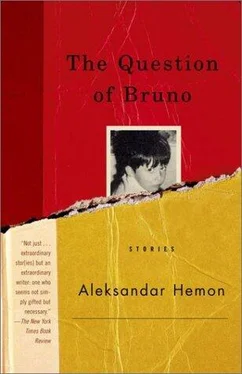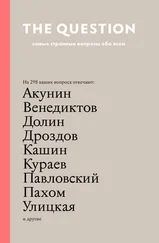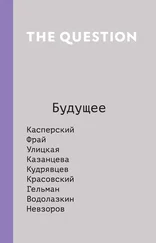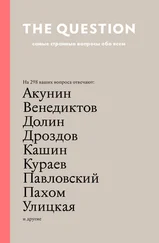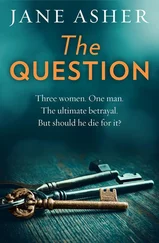We could hear the Hemons-Hemuns hollering against the music, which from a distance sounded discordant. We could still hear the trucks and I vaguely realized that they had been passing by all day. “I wish these trucks would stop,” I said.
“They probably won’t for a while,” my mother said. Her hands smelled of coffee and vanilla sugar. She told me about the time her father gave their only horse away.
“It was in forty-three or forty-four, a young man came running out of the corn. Mother and Father knew him, he was lanky and had blue eyes, a Muslim from a nearby village. He said that the Chetniks had killed his whole family, that he escaped by leaping through a window and now they were after him. He had a bruise on his cheek, as if someone had kissed him with plum-lips. He asked my father for the horse so he could get away and join the partisans. Father glanced at my mother, she said nothing, but he knew and he went to get the horse, cursing all along: ‘Fuck this world and the bloody sun and this country when everyone needs my horse.’ The young man, his name was Zaim, kissed both of my father’s cheeks and promised he would return the horse once the evil had blown over. So he rode off, waving at us. But then the Chetniks came riding their horses, like cowboys. ‘Where is he?’ they yelled. ‘Where’s the circumcised dog?’ And my father says: ‘What’s the trouble, brothers?’ They all have beards and rifles and knives, they shout: ‘Did you see the Turkish bastard?’ Father says: ‘I don’t know who you’re talking about.’ ‘You’re lying!’ they yell. ‘You’re a traitor!’ Then they beat him with rifle butts, they throw him on the ground and kick him with their boots. ‘What’s wrong with you, motherfucker, you’re one of us! Where’s the Turk? Who’s he to you?’ I thought they would slit our throats, no problem. My brother was in the partisans, but we spread the word that he was in Srem, working.”
“You’ve never told me this,” I said.
She continued: “They kept beating him until he was bleeding and unconscious. My mother wept and begged them to spare him. Then one of them, beardless, came to me and said: ‘There’s a little Serbian girl who is going to tell us where the Turk is.’ Oh, I couldn’t say a word, and then I saw my mother’s eyes, frightened, and her hands squeezing the strength out of each other. I told them I didn’t see anyone and that I would tell them if I did. So they left, and the beardless one told us that he would personally judge us if he found out we were lying. That was our only horse, you know, all we had.”
I resisted falling asleep, trying to keep my eyes open, but then I succumbed, leaning on my mother’s shoulder, even in my dreams aware of the possibility of disgorging myself. I slept for hours, thinking in my troublesome sleep that I was leaning on my mother, but then I woke up, with my cheek on a molehill, sprawled on the ground which was covered with rotting apples. I went back to the yard and all the Hemuns were gone, as if I had dreamt them; and everyone else, scattered around, was cleaning up, storing away the food or taking the tent and the stage apart. I need not have been there to know what happened at the end. It could all be seen on the tape, which we occasionally watch when I visit my parents in Schaumburg, Illinois. We rewind and fast-forward, to get to the moment we most want to cherish. We freeze the frame to remember a name, we fill in the gaps, caused by unwarranted cuts and blanks due to a ten-dollar conversion in a Pakistani store on Devon. Frequently, there’s a little tide of fractious dots rising from the bottom of a trembling picture, always trying to reach the center. Finally, the last image is of my mother, just about to say something — something irreverent about “the Hemon propaganda,” perhaps. That is all too clear from her clever eyes and the lingering, undeveloped grin. She never says it, forever on the verge of saying something. She can never remember what she was going to say, and the screen suddenly turns blindingly blue, and we turn it off and rewind the tape to the beginning.
Suppose there is a Point A and a Point B and that, if you want to get from point A to point B, you have to pass through an open space clearly visible to a skillful sniper. You have to run from Point A to Point B and the faster you run, the more likely you are to reach Point B alive. The space between Point A and Point B is littered with things that sprinting citizens dropped along the way. A black leather wallet, probably empty. A purse, agape like a mouth. A white plastic water vessel, with a bullet hole in its center. A green-red-brown shawl ornamented with snowflakes, dirty. A wet loaf of bread, with busy ants crawling all over it, as if building a pyramid. A videocassette, dismembered, several of its pieces still connected with a dark writhing tape. On days when snipers are particularly rabid, there are scattered bodies as well. Some of them may still be alive and twitching toward the distant cover, leaving a bloody trail behind, like snails. People seldom try to help them, for everybody knows that the snipers are just waiting for that. Sometimes a sniper mercifully finishes off the crawling person. Sometimes the snipers play with the body, shooting off his or her knees, feet, or elbows. They seem to have made a bet how far he or she is going to get before bleeding away.
Sarajevo is a catless city. It is so because people couldn’t feed them, or couldn’t take them along when they were fleeing, or their owners were killed. Hence the dogs that couldn’t be fed or taken along hunt them down and devour them. One can often see, among the rubble on the streets, underneath burnt cars, or stuck in sewers, cat carcasses, or cat heads with a death grin, eye-teeth like miniature daggers. Sometimes one can see two or more dogs fighting over a cat, tearing apart a screaming loaf of fur and flesh.
Aida’s letters are scarce and sudden, escaping the siege via UN convoys, foreign reporters, or refugee transports. I imagine them in a sack, in the back of a UN truck, driven by a Pakistani or Ukrainian soldier oblivious to everything but the muddy road before him and the gaze of the bearded thugs by the road, their index fingers conspicuously close to the trigger; or a letter in a reporter’s bag carelessly thrown over a tattooed shoulder, sharing the bottom of the bag with a Walkman, notebooks, condoms, bread and pot crumbs, and a wallet crammed with family pictures. I imagine letters in a post office in Zagreb or Split, Amsterdam or London, in the midst of a pile of letters sent to people I know nothing about by the people who care about them. Sometimes it takes dismal months for her letters to reach me and when I open my mailbox — a long tunnel dead-ending with a dark square — and find Aida’s letter, I shiver with dread. What terrifies me is that, as I rip the exhausted envelope, she may be dead. She may have vanished, may have already become a ghost, a nothing — a fictitious character, so to speak — and I’m reading her letter as if she were alive, her voice ringing in my brain, her visions projected before my eyes, her hand shaping curved letters. I fear to communicate with a creature of my memory, with a dead person. I dread the fact that life is always slower than death and I have been chosen, despite my weakness, against my will, to witness the discrepancy.
In September, Aunt Fatima passed away. She had had asthma for a long time, but in September she just asphyxiated in our apartment. They were pouring shells for weeks on end, and even when they didn’t there was an eager sniper. He killed our neighbor who hadn’t even left the building. He just peeked out of the door, cautiously ajar, and the bullet hit him in the forehead and he just dropped down dead. Anyway, Aunt Fatima ran out of her asthma medicine, and she couldn’t go out. The windows had been shattered long ago. She was always cold, breathing in cold air saturated with floating dust and hovering particles of rubble. She simply suffocated, producing that inhaling, sucking sound, and nothing was being inhaled. We couldn’t bury her, or even take her out, because they kept shelling and sniping as if there was no tomorrow.
Читать дальше
